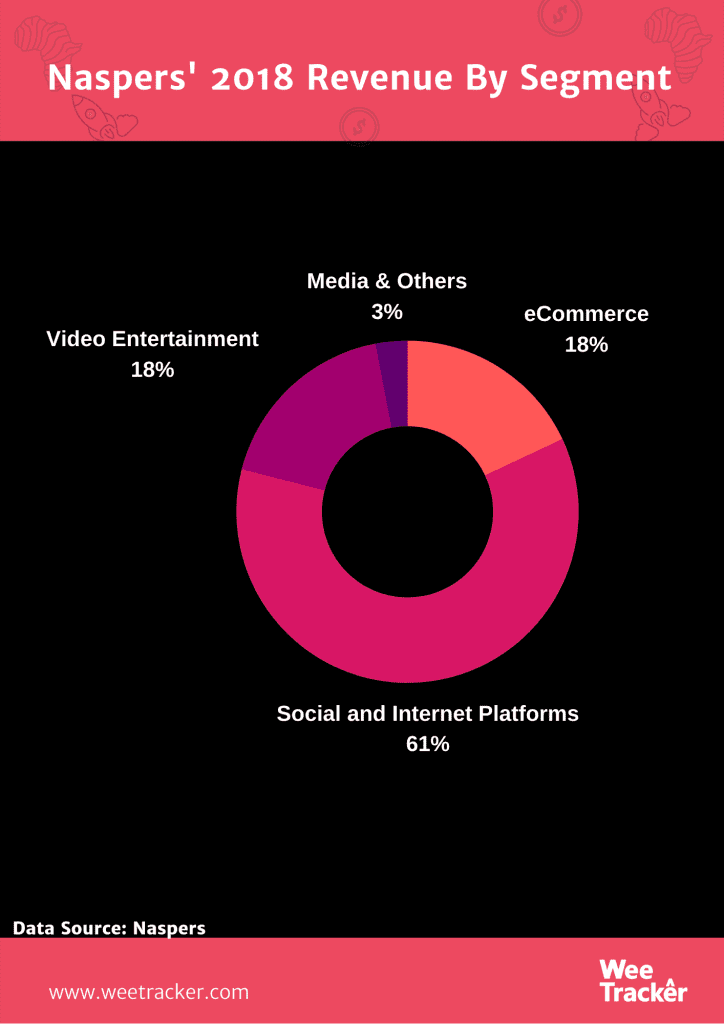Africa’s Most Valuable Company Is Caught In A Crossfire That It Can’t Escape

Tensions were heightened in the protracted US-China trade war early this month when U.S. President Donald Trump signed a pair of executive orders prohibiting U.S. residents from doing business with the Chinese-owned apps, TikTok and WeChat, citing national security concerns.
As a ripple effect, Naspers, the South African firm that is on record as the most valuable publicly-traded company in Africa, is reeling as it finds itself caught in the crossfire.
How so? The South African multinational internet group owns a huge piece of something Chinese and that thing is also the main driver of the value of its own stock, as it has since overshadowed the operational aspects of the Naspers business.
The “thing” being referred to is Tencent, one of the biggest companies in Asia. Think of Tencent as Facebook, Netflix, WhatsApp, Marvel, Spotify, and PayPal lumped together. However, it is Tencent’s messaging apps, WeChat and QQ, that are the toast of it all.
WeChat is the consummate super app. It may have been launched by a small group of friends back in 1998 as a clone of an Israeli instant messaging service, but it’s now part of daily life.
WeChat is the most-used messaging app with over a billion users who spend a reported cumulative 1.7 billion hours on the app every day as they chat, shop, flirt, watch videos, play games, order food and taxis, and more.
The structure looks something like this: Tencent owns WeChat and many other services that cut across social network, music, web portals, e-commerce, mobile games, internet services, payment systems, smartphones, and multiplayer online games. And Naspers happens to be the largest shareholder in Tencent with 31 percent stake.
Naspers bought into Tencent back in 2001 when it made an early investment of USD 32 Mn in the then startup, acquiring 46.5 percent of the company from early investors like PCCW and IDG Capital.
When Naspers sold part of Tencent stake in March 2018 for USD 10 Bn, it’s initial USD 32 Mn investment had ballooned to a stake worth over USD 175 Bn. Indeed, that USD 32 Mn investment has been described as one of the most successful venture capital investments of all time.
As a matter of fact, the market value of Naspers’ Tencent holdings is greater than the market cap of Naspers itself. Naspers has been listed on the Johannesburg Stock Exchange (JSE) since 1994.
It follows that when Tencent takes a beating, Naspers gets a shudder too, despite having other huge investments in internet communication, entertainment, gaming, and e-commerce.

So when the latest installment of the US-China spat signaled that the Tencent-owned app, WeChat, is a target, Tencent took a beating, and so did Naspers.
South Africa’s main stock index derailed from a four-day rally, falling 1.3 percent in Johannesburg on Friday, August 7, as index heavyweight, Naspers, dropped 4.4 percent a day after President Trump signed the executive orders.
Naspers holds the majority stake in WeChat’s owner, Tencent, which plunged as much as 10 percent in Hong Kong on that same day. Naspers subsidiary, Prosus, which holds the company’s stake in Tencent, dropped 5.4 percent.
On the other hand, Tencent released its second-quarter results on Wednesday, August 12, showing a net profit growth of 37 percent, beating market estimates. The surge was attributed to a higher demand for its videogames as coronavirus-related lockdowns kept most of the world grounded.
Although it is largely recognised as the owner of WeChat, Tencent is also the world’s largest video game company by revenue.
Upon the release of the latest quarterly results which posted better-than-estimated revenue and profit figures, Tencent’s stock soared. And as expected, Naspers followed suit.
As TechCentral reported, Naspers internet spin-off, Prosus, which holds the stake in Tencent, rose more than 3 percent in Amsterdam on the news. Naspers also climbed more than 3 percent in Johannesburg.
Featured Image Courtesy: BusinessTimes